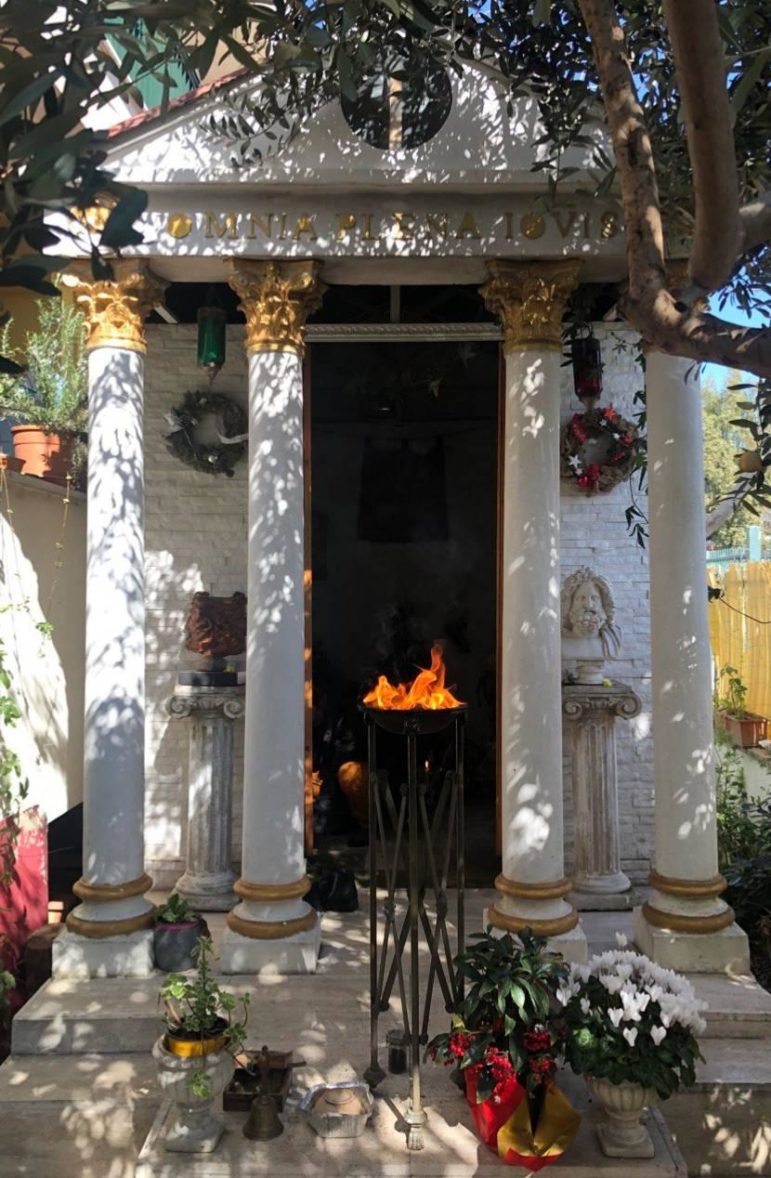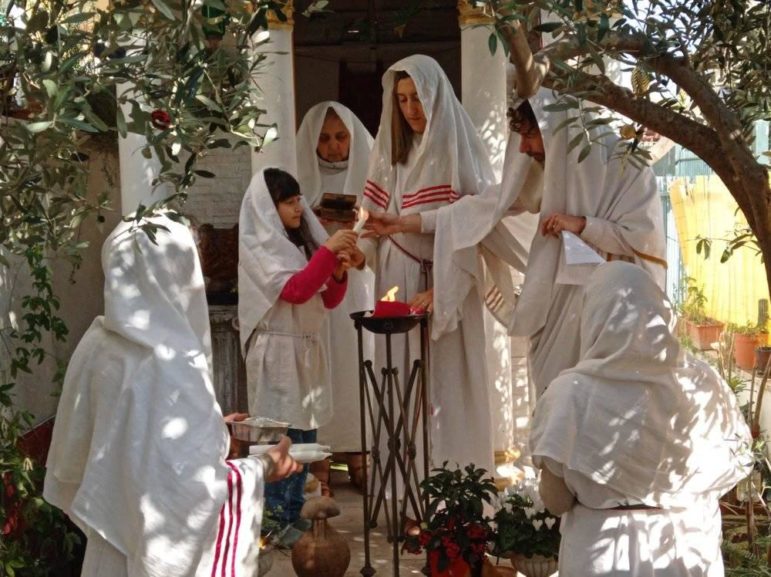
via Facebook
ROME – Today, the Traditional Pietas Association in Rome re-kindled the Vestal Flame as it has done since 2007 CE when it was returned for the first time since it was extinguished in 394 CE by order of the Christian emperor Theodosius I to eliminate Pagan practices in Rome.
The sacred flame of Vesta burned in Ancient Rome as a symbol of the goddess’ protection of the city. Vesta is the goddess of the hearth, home, and family in the Roman religion. She was among the Dii Consentes, the twelve most honored gods in the Roman pantheon. Her Aedes – her “temple” – is located within the Roman Forum, and her fire brought safety and fortune to Rome.
The lighting of the Flame and rite was performed at the new dedicated Aedes Vestae in Rome, rekindling the metaphysical fire of Ancient Roman times that had been continuously lit since 2760 BCE.
The date is also significant. March 1st – referred to as the kalends or “first of the month” in the Roman calendar- is the traditional renewal of the sacred fire to Vesta. It is also the beginning of Matronales Feriae or Matronalia, the feast of Juno in Ancient Rome. The feast was celebrated annually by married Roman matrons who processed to the temple with offerings for marital happiness.

via Facebook
In the Calendar of Romulus, which contained 10 months and preceded the later Julian calendar, March or Mensis Martius, was named after the god Mars. The month marked the end of winter, the return to farming and campaigning, and the beginning of the year. Mars, who was not only the god of war but also of agriculture and the state, was a tutelar deity of Rome and was regarded as the instigator of the Roman people through his sons, Romulus and Remus.
The event was attended by Pontifex Maximus Hermes Helios of the Associazione Tradizionale Pietas that reorganized as a new legal entity, Pietas – Comunità Gentile. Pietas is now recognized under Italian law as a valid national religious community, lending additional legitimacy to the Religio Romana.
Barbera wrote, “The new sacred year opens with today.” He expressed his wishes to all for joyous and enlightening spiritual growth in the coming year.
◊ ◊ ◊

Areial View of the Capitol – Image credit: Office of the Architect of the Capitol – Public Domain
WASHINGTON – Last week representatives, Reps. Bobby Scott (D-VA), Mary Gay Scanlon (D-PA), Jamie Raskin (D-MD), and Steve Cohen (D-TN) reintroduced the Do No Harm Act, H.R. 1378.
The Do No Harm Act was first introduced by Rep. Joseph P. Kennedy III (D-MA) as H.R. 1450 in February of 2019. It was read twice on the floor of the House of Representatives before being referred to the House Judiciary Committee on February 28, 2019, who then referred it to the Subcommittee on the Constitution, Civil Rights, and Civil Liberties and it has been languishing ever since.
By the end of 2020, the bill had 215 co-sponsors in Congress. Since its reintroduction last week, it has been endorsed by nearly 100 faith, civil, and human rights organizations. Lady Liberty League and Circle Sanctuary, American Civil Liberties Union, Americans United for Separation of Church and State, GLBTQ Legal Advocates & Defenders (GLAD), and the Human Rights Campaign are just a few of those who support the legislation.
The proposed bill seeks to clarify the original Religious Freedom Restoration Act (RFRA) that was passed by both Houses of Congress and signed into law under President Bill Clinton in 1993.
Circle Sanctuary as part of its work with its Lady Liberty League supports the Do No Harm Act which is defined as – the right to believe or not, as we see fit, so long as we all do not harm others, and will help end the misuse of religious freedom to discriminate in the name of faith.
The original RFRA was written to protect both the religious rights of minorities and to ensure laws written with the intent of being “neutral” did not place an undue burden or interfere with religious practices.
How the RFRA has been interpreted has changed since its passage in 1993, as noted in the fact sheet released by House Committee on Education and Labor:
At the time of its passage, RFRA was supported by a broad bipartisan coalition that represented diverse faith groups, legal experts, and civil liberty advocates. However, despite its clear intent to protect people from discrimination, RFRA has increasingly been misused to harm the rights of others. For instance, RFRA has been cited by employers claiming religious objections to recognizing worker protections under the National Labor Relations Act.
Two Supreme Court rulings have escalated the potential misapplication of RFRA. First, the Court’s ruling in Burwell v. Hobby Lobby Stores, Inc. permitted corporations to rely on RFRA to deny certain preventive health care services to their employees. And last year, the Court’s majority opinion in Bostock v. Clayton County called RFRA a “super statute” indicating that “it might supersede Title VII [of the 1964 Civil Rights Act]’s commands in appropriate cases.”
While the original RFRA was nearly unanimously supported by members of both houses with only three senators voting against it, the current Congress and Senate are far more sharply divided than they were in 1993.
◊ ◊ ◊

Cherry Hill Logo
The Cherry Hill Seminary Votaries Alumni Circle announced that Dr. Deirdre Sommerlad-Rogers the first recipient of the Wendy Griffin Professor of the Year Award.
The announcement was made by Votaries member Cynthia Cebuhar, who said of in a statement:
This nominee has illustrated by personal and professional example how to be completely respectful of the diversity of personalities and opinions in this world. We’ve all witnessed the abundance of enthusiasm for any subject this individual has taught, such that students are consistently engaged in lively dialog that truly only comes to a close because our attention is called to the class ending time. In the most recent class I took with this nominee, there were several of us a bit intimidated by putting together powerpoint presentations, and this nominee was immensely encouraging and helpful so we could be successful.
This nominee is driven by an incredible curiosity about life and communicates this to students in such a way that is catching. You can’t help but think, “I’ve never thought about that before” and that leads to building connections in such amazing ways. On a personal note, this nominee has the patience and fortitude to answer any question I’ve sent their way, and the best part is–we share a love of goats!
Sommerlad-Rogers was appointed Chair of the Department of Ministry, Advocacy & Leadership for Cherry Hill Seminary in 2018, and has served as Cherry Hill Seminary faculty in the department since 2011.
She received her bachelor’s and master’s degrees from San Jose State University, in Psychology and Sociology, and her Ph.D. in Sociology from Bowling Green State University, with minors in Women’s Studies and Social Psychology. She had held the position of tenured professor and Department Chair in Sociology and Criminal Justice. She is currently consulting as a statistical and dissertation consultant. Her areas of focus and teaching have included criminal justice, inequalities, and the social construction of difference.
In other news:
- Today, March 1, marks the 329th anniversary of the beginning of the Salem Witch Trials in Salem Village, Massachusetts. Before the trials were over in May of 1693, over 200 people would stand accused of practicing “witchcraft.” Of those accused 30 would be found guilty and 19 would be executed. While the courts declared the trials unlawful in 1702, and in 1711 the colony of Massachusetts would pass a bill that restored the rights and names of those accused, it would not be until 1957 that the state would issue a formal apology for the events of 1692.
- Selena Fox and Circle Sanctuary‘s Circle cemetery are featured in this month’s Madison Magazine in an article on green burials and highlights how Fox and Circle were one of the first to offer green burial options. Fox is quoted in the article as saying, “It’s taking an ancient human burial practice and combining it with something that’s very much needed today, which is intentional preservation of green space and ecological restoration. It’s designed to have the body break down through natural processes and the container that holds it to return to nature, feed the roots of the trees, to be part of the soil.”
- Last week the Cherokee Nation’s Supreme Court ruled to change its constitution and other legal doctrines by removing the words “by blood.” The constitution was amended in 2007, to include the words “by blood” which were used to exclude Black people whose ancestors were enslaved by the tribe from obtaining full Cherokee Nation citizenship rights. A 2017 federal court ruling found that the addition of the words and the amendment to the Cherokee constitution violated the 1866 treaty the Cherokee Nation signed with the U.S. government since the treaty granted citizenship to formerly enslaved peoples. There are currently about 8500 tribal members that are descended from Freedmen. “The Freedmen, until this Cherokee Nation Supreme Court ruling, they couldn’t hold office, they couldn’t run for tribal council and they couldn’t run for chief,” says Graham Lee Brewer, an editor for Indigenous affairs at High Country News and KOSU in Oklahoma. “And I would argue that that made them second-class citizens.”
- Leonardtown, Maryland commissioners have designated February 26th as Moll Dyer Day. Moll Dyer was a woman who lived near Leonardtown and is believed to have served the community as a healer. It was Dyer’s misfortune that an influenza outbreak in 1697 led the town’s inhabitants to accuse her of practicing “witchcraft” and burnt her home to the ground. Dyer managed to escape into the woods but due to the bitter cold die of exposure and was found with one hand frozen to a large rock and the other outstretched towards the sky. Legend has it that her handprint on the stone was a sign of her cursing the village and that anyone who touches her handprint experienced sensations of dizziness and even nausea. The rock was moved in 1972 to the Old Jail but the St. Mary’s County Historical Society moved it to the home of the Historical Society at Tudor Hall Manor to better preserve it. “Our mission is to preserve the history of St Mary’s County and the Moll Dyer Rock is certainly one of the best known and cherished parts of that history,” Peter LaPorte, Executive Director of the Historical Society said.
Positively Noteworthy
Monarch butterflies populations while not officially listed as endangered, continue to decline with some of the lowest numbers recorded in the last two years. Conservation efforts in Mexico have been a key aspect to not only protecting the Monarchs but also helping to support the communities that surround the Cerro Pelón sanctuary.
Monarch butterflies have changed this family’s lives and those around them.
https://t.co/CVYSPiJJyS pic.twitter.com/YpysdvMm9u
— NRDC
(@NRDC) February 24, 2021
Tarot of the week by Star Bustamonte
 Deck: Joie d Vivre Tarot by Paulina Cassidy, published by U.S. Games Systems, Inc.
Deck: Joie d Vivre Tarot by Paulina Cassidy, published by U.S. Games Systems, Inc.
Card: Knight of Swords
The week ahead will likely call for the ability to combine critical thinking with a careful and creative approach in order to achieve the desired result. Strong belief and passion, in the face of opposition, can help ensure success. Conversely, leaping into action without due consideration could produce the opposite outcome sought, and result in delays.
Decks generously provided by Asheville Raven & Crone.
The Wild Hunt is not responsible for links to external content.
To join a conversation on this post:
Visit our The Wild Hunt subreddit! Point your favorite browser to https://www.reddit.com/r/The_Wild_Hunt_News/, then click “JOIN”. Make sure to click the bell, too, to be notified of new articles posted to our subreddit.

